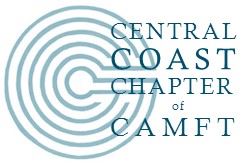
Central Coast–CAMFT
presents:
Presented By:
Stephanie Kollar, MA, LMFT
Friday, July 18th, 2025
9:30 am - 11:30 am
2 CE Credits
Via Zoom
* This event will be recorded and distributed to registrants so if you cannot make the event live, but want the recorded version, please register here*
Overview of Presentation
This presentation, led by an autistic mental health therapist, will guide clinicians through a deep exploration of neurodivergence, trauma, and the challenges in understanding and identifying neurodivergent clients. Drawing from lived and professional experience, this course will provide clinicians with a framework to reduce ableist perspectives, enhance therapeutic rapport, and apply an anti-ableist, affirming worldview to their practice. The presentation will delve into the nuances of Autism Spectrum Disorder (ASD), ADHD, and Complex PTSD (CPTSD), highlighting how these conditions intersect and how therapists can more accurately identify and support neurodivergent clients. Participants will leave with practical tools to navigate sensory processing needs, adapt existing evidence-based practices, and reframe their approach to neurodivergence for more inclusive, effective care.
Presentation Goals:
This course is designed to help therapists identify and understand the lived experience of neurodivergence, while reducing ableist identification of neurodivergence. By reframing neurodivergence through an anti-ableist, affirming worldview, clinicians will be equipped to enhance their approach to trauma-informed care and adapt their practices to better serve neurodivergent clients.
Measurable objectives:
- Participants will be able to differentiate 3 differences between Autism Spectrum Disorder (ASD), Attention Deficit Hyperactivity Disorder (ADHD), and Complex PTSD (CPTSD), identifying the key similarities and differences between these conditions.
- Participants will be able to recognize and address 3 common areas of misdiagnosis, especially in clients of color, and understand the implications of such misdiagnoses.
- Participants will explore 3 strategies for adapting existing evidence-based practices to meet the unique needs of neurodivergent clients.
Speaker Bio:

Stephanie Kollar, MA, LMFT has a diverse background in mental health work, including field-based family therapy with families living in poverty and navigating high levels of intersectional identities. Specializing in neurodivergence, trauma, anxiety, depression, and behavioral challenges, Stephanie developed a keen ability to differentiate between subtle diagnostic distinctions and recognized the importance of honoring neurodivergent differences. She has also provided short-term, evidence-based care for adults and now runs a private practice focused on anti-ableist, affirming care for neurodivergent individuals. As a professor in the Master’s of Clinical Psychology program at Antioch University Santa Barbara, her alma mater, Stephanie specializes in the intersection of neuroscience and anti-ableist mental health care. Identifying as both autistic and ADHD (AUDHD), she integrates her lived experience into her work, helping students and colleagues better understand and engage with the neurodivergent experience.
CE Qualifications:
Unless otherwise specified, our courses meet the qualifications for 2 hours of continuing education credits for LMFTs, LCSWs, LPCCs and/or LEPs as required by the Board of Behavioral Sciences. Participants will receive an evaluation via email and upon completion of the eval, will get a downloadable CE certificate.
The Central Coast Chapter of CAMFT is approved by the California Association of Marriage and Family Therapists to sponsor continuing education for MFTs, Associates and students, MSWs, LEPs and LPCCs. The Central Coast Chapter of CAMFT maintains responsibility for this program/course and its content.
 Grievance:
Grievance:
While the Central Coast Chapter of CAMFT makes every effort to assure fair treatment for all participants and attempts to anticipate problems, there may be occasional issues with regard to presentations/workshops which will require intervention and/or action on the part of the board. This procedural description serves as a guideline for handling such grievances.
When a participant files a grievance and expects action on the complaint, the following actions will be taken:
- The participant(s) will be asked to put concerns in writing (this can be in electronic form, such as an email).
- If the grievance concerns a presenter, the content presented by the speaker, or the style of presentation, the individual filing the grievance will be asked to put their comments in written format. The Board will then pass on the comments to the speaker, assuring the confidentiality of the grieved individual.
- If the grievance concerns a presentation/workshop offering, its content, level of presentation, or the facilities in which the workshop was offered, the Board will mediate and will be the final arbitrator. If the participant requests action, the Board will:
- provide a credit for a subsequent presentation/workshop or
- provide a partial or full refund of the presentation/workshop fee
Refund policy: registrants must cancel their registration within 10 days of the event to receive a refund minus a $5 administrative fee. Exceptions can be made for 48-hour notices in case of an emergency. If you need to cancel, please contact Event Chair, Kim Richards: richardskimlmft@gmail.com.
Special Accommodations
If you require a reasonable accommodation in order to participate in any of our events, please contact Event Chair Kim Richards within 10 days of the upcoming event at 805.458.8063 or email Kim Richards at richardskimlmft@gmail.com.